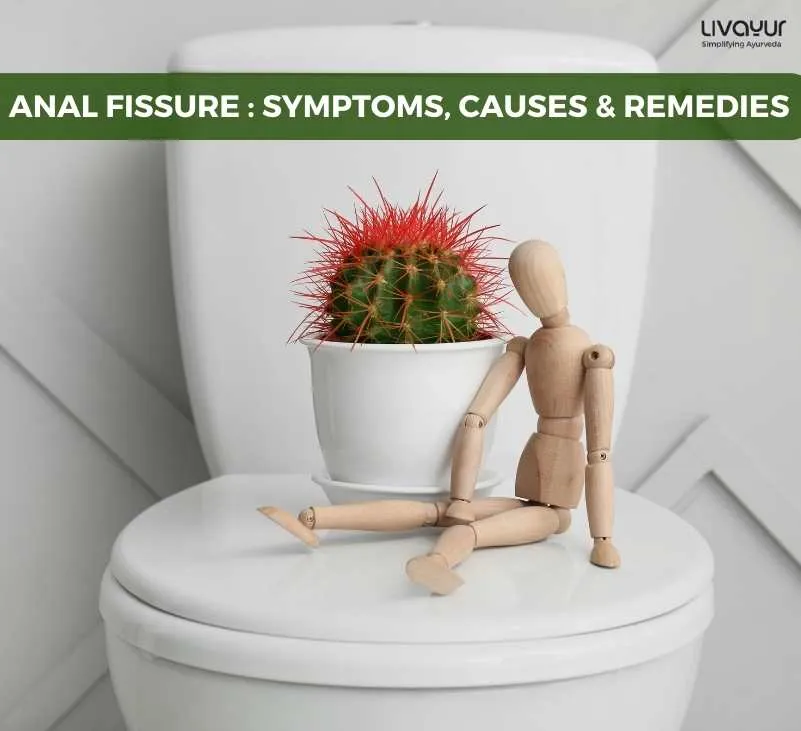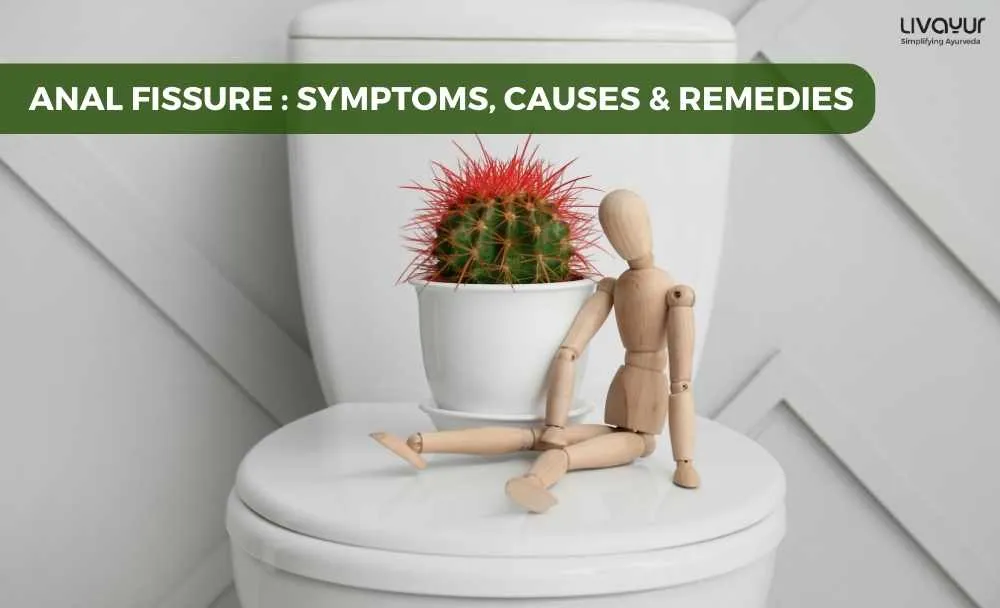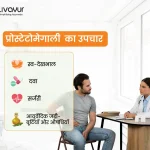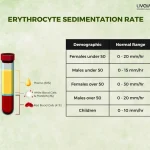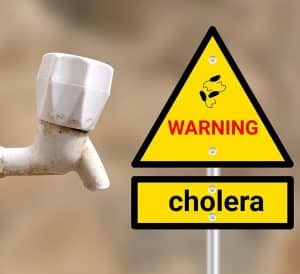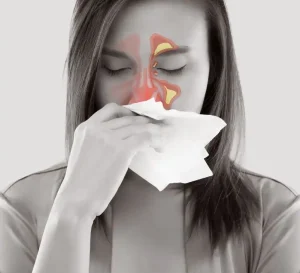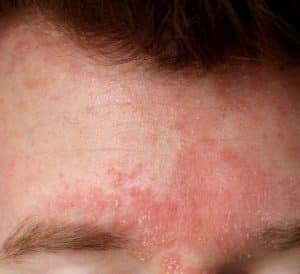शरीरेन्द्रिय्सत्त्वात्म्संयोगो धारि जीवितम् । नित्यगश्र्चानुबन्धश्र्च पर्यायौरायुरुच्यते ॥
The body when combined with the sense organs, mind and soul, becomes life
An anal fissure can be a distressing and uncomfortable condition affecting the anal region. Although often considered a taboo subject, it is essential to address the anal fissure symptoms, causes, and available anal fissure treatment and remedies to promote understanding and support those experiencing this condition. An anal fissure is a widespread anorectal condition often associated with elevated internal anal sphincter pressures. It is essentially a linear or oval-shaped small tear or split in the anal canal, which can cause pain, discomfort, and sometimes rectal bleeding.[1] This encompasses the answer to what is anal fissure.
A patient suffering from anal fissure usually heals without having to opt for operative management by choosing a high-fiber diet, sitz baths, and pharmacological agents. Only in cases where such non-operative options do not work anymore can a surgical anal fissure treatment such as lateral internal sphincterotomy be reached out for. [1]
In this article, we will go into a detailed discussion of the anal fissure symptoms, causes, remedies, and the anal fissure meaning.
What are the causes of anal fissures?

It is believed that an anal fissure typically occurs when the delicate tissues surrounding the anus are stretched beyond their limits, and the anal canal undergoes trauma. While anyone can develop an anal fissure, it is more common in individuals who engage in activities that strain the anus, which may come about from a variety of reasons, including:
- One of the anal fissure causes is trauma to the anoderm during the passage of hard or large bowel movements.[2]
- Local irritation from diarrhea[2]
- Anorectal surgery
- Inflammatory bowel syndrome[2]
- Yet another of the various anal fissure causes is engaging in anal intercourse[1]
- Decreased blood circulation in the area [3]
Excessive tension in the sphincter muscles that control the anus[3]
What are the symptoms of anal fissures?
The most common symptoms of Anal Fissure include:
- Intense pain during and after bowel movements.
- Sharp and tearing pain that can last for hours.
- Small lump near the anal opening.
- Rectal Bleeding
- Itching
- Irritation[1]
How are Anal Fissures Diagnosed?
Anal Fissure is diagnosed in the lateral posture, carefully dividing the buttocks to view the anal canal. The majority of fissures start posteriorly in the midline. Acute fissures can be identified by a recently formed skin break right inside the anal border. A skin tag, or “sentinel tag,” is typically present at the distal end of chronic fissures, exposing the internal sphincter’s circular fibers.
An examination frequently reveals anal canal spasms brought on by anal sphincter hypertonia. In primary care, a digital rectal exam is not advised because of the associated pain. 3
Ayurvedic Treatment For Anal Fissure
Ayurvedic treatment provides a permanent remedy for fissures. Pain, irritation, and inflammation associated with fissures can be lessened with the use of Ayurvedic herbs and medications.
- Sonamukhi is an Ayurvedic herbaceous plant that is regarded as extremely beneficial, particularly in cases of chronic constipation. This plant supports the peristaltic activity of the intestines, easement, and improves bowel movements.
- Nagkesar has a protective execution inside the gastrointestinal pathway and reduces the hazard of transmission, thanks to its antiseptic, anti-inflammatory drugs, and antioxidant properties.
- Triphala Churna is taken with warm water. It reduces pain, encourages healing, relieves constipation, and thereby stops the bleeding of fissures. It has a cleansing effect on fissures and reduces the risk of infection.
What are the remedies for anal fissures?
In case of severe or acute anal fissure symptoms, the only anal fissure treatment could be through surgical intervention, especially when conservative measures do not yield satisfactory results. These may include medical procedures such as Anal dilation, Lateral internal sphincterotomy, Advance flaps, or Fissurectomy.[1] Fortunately, various remedies are available to alleviate the discomfort caused by anal fissures.
- Getting rid of the underlying pathology that is responsible for the anal fissure by taking care of constipation and strains
- Another popular anal fissure treatment is relaxing the internal anal sphincter to improve blood flow and allow healing by adopting a variety of therapies.
- Alleviating the anal fissure symptoms, which are primarily bleeding and pain[1] Some of the best home remedies for anal fissure include:

4. Adopting a high-fiber diet and staying hydrated.
5. Going for warm sitz baths improves hygiene, soothes and decreases pain and the hypertonicity of the anal canal, and enhances the healing process.
6. Establishing regular bowel habits
7. Over-the-counter topical anal fissure ointment or creams containing agents such as glyceryl trinitrate can provide temporary relief from pain and promote healing [1]
You Need To See a Doctor If
- There is a large amount of rectal bleeding, especially if it comes with lightheadedness, dizziness or feeling faint.
- Anal pain that gets much worse, spreads or comes with fever, chills or anal discharge.
- If your anal fissure proves to be particularly severe or does not show improvement with treatment after 8 weeks, consult your healthcare provider for further evaluation.
Anal Fissure Prevention
Once you have developed an anal fissure, you should take these easy precautions to prevent developing another one.
Consume a lot of fiber. An anal fissure may develop as a result of passing large, hard, or dry faeces while constipated. However, consuming an ample amount of fiber-rich foods, particularly fruits and vegetables, can help ward off constipation.
Consume 20–35 grams of fiber daily. Good sources of fiber include:
- Wheat Bran
- Oats Bran
- Brown rice, oatmeal, popcorn, and whole-grain pasta and cereals are examples of whole grains.
- Beans and Peas
- Nuts and Seeds
- Fruits of the citrus
- If your diet isn’t providing enough fiber, consider taking fiber supplements.
FAQs
- How should one adjust their diet when suffering from anal fissure?
An anal fissure treatment at home is to take care of the diet and drink lots of water, include more fresh fruits and vegetables in it, and avoid spicy foods and nuts while the symptoms last.
- How long do anal fissures last?
While most of the time, an anal fissure takes a couple of days to nearly a week to heal, in other cases, like in chronic anal fissures, the symptoms usually last more than eight weeks. In case a patient is under treatment for chronic anal fissure, it may take about 6-12 weeks for the medicine to start working and the condition to heal.
- Can anal fissures go away by themselves?
The acute or temporary anal fissures sometimes go away by themselves and may not require any treatment at all. However, some might need a prescription cream or anal fissure ointment for temporary pain relief, but if the condition does not heal even after several weeks, it needs surgical treatment.[2]
Conclusion
To answer the question, what is an anal fissure, an anal fissure is a prevalent pathophysiological condition associated with elevated sphincter pressures. It is essential to correctly diagnose the problem first to rectify it through various conservative and modern ways of healing. In this article, we have attempted to raise awareness about this painful affliction and help understand the symptoms of anal fissures. We have also explored the various types of care, support, and remedies that can be adopted by a patient suffering from anal fissure to bring down discomfort and heighten the quality of life. Some of these include effective anal fissure treatment at home, such as having a high-fiber diet, avoiding constipation, and using anal fissure ointment and stool softeners.[2]
Disclaimer
This article is written from a health and wellness perspective and is not medical advice. Kindly seek the help of a certified medical practitioner before initiating any treatment.
References
- Anal Fissure
- Anal Fissures
- Anal Fissure
- www.hopkinsmedicine.org/health/conditions-and-diseases/anal-fissures#:~:text=An%20acute%20anal%20fissure%20typically,a%20more%20aggressive%2C%20surgical%20approach.
- https://www.uptodate.com/contents/anal-fissure-beyond-the-basics/print#:~:text=Once%20a%20fissure%20develops%2C%20these,last%20several%20minutes%20to%20hours.
- https://www.mayoclinic.org/diseases-conditions/anal-fissure/diagnosis-treatment/drc-20351430#:~:text=Anal%20fissures%20often%20heal%20within,the%20sphincter%20and%20promote%20healing.
- https://www.ncbi.nlm.nih.gov/pmc/articles/PMC6650108/
- https://my.clevelandclinic.org/health/diagnostics/24212-digital-rectal-exam
- https://pilesmedicine.in/blog/how-ayurvedic-treatment-heals-fissures-problem/
- https://www.nhs.uk/conditions/anal-fissure/treatment/#:~:text=If%20your%20anal%20fissure%20is,having%20some%20type%20of%20surgery.
- https://www.mayoclinic.org/symptoms/anal-pain/basics/when-to-see-doctor/sym-20050918
- https://www.webmd.com/digestive-disorders/anal-fissure-causes




